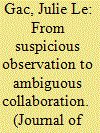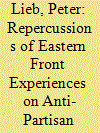|
|
|
Sort Order |
|
|
|
Items / Page
|
|
|
|
|
|
|
| Srl | Item |
| 1 |
ID:
083481


|
|
|
|
|
| Publication |
2008.
|
| Summary/Abstract |
There was not, except in the very broadest sense, a unified 'Allied' grand strategy regarding any aspect of World War II. British-American strategy and Soviet strategy were formed in isolation. This was certainly true of the strategy of anti-German insurgency. Aside from geographical and ideological factors a major source of difference was that Britain was at war with Germany from September 1939, while the USSR and the USA became involved two years later. There were major asymmetries: Moscow's insurgency strategy for most of the war was in practice applied to its own national territory, while British (and later American) insurgency strategy was applied to foreign countries occupied by Germany. It will be argued, however, that in different parts of the Grand Alliance the path of insurgency strategy followed a similar trajectory, even if this strategy was not synchronised in time or space. In London, Moscow, and Washington, high hopes were initially placed on popular rebellion in German-occupied territory. It was only months after the entry of their countries into the war that the high commands, both west and east of the Reich, came to the conclusion that insurgent forces could only be used as an auxiliary to huge conventional armies.
|
|
|
|
|
|
|
|
|
|
|
|
|
|
|
|
| 2 |
ID:
083482


|
|
|
|
|
| Publication |
2008.
|
| Summary/Abstract |
During the first months of the Italian Campaign, partisans' activity was isolated and spasmodic, and Allied support was minimal. In fact, it took the Allies nine months to consider the Italian partisans not so much as a threat as a potential opportunity. This article seeks to explain the Allies' attitude toward the Italian partisans. Relations among the Allies, the Italian government and the partisans involved a combination of military and political problems. The Allies' weak support for Italian partisans was in fact the by-product of an overall strategic plan in which means were limited and priorities had naturally to be established in a context of world war. It also revealed their fears: the common suspicion toward irregular fighters, the growing fear of communists and the fear of possible Italian post-war demands
|
|
|
|
|
|
|
|
|
|
|
|
|
|
|
|
| 3 |
ID:
083479


|
|
|
|
|
| Publication |
2008.
|
| Summary/Abstract |
This introductory article begins by sketching the general historical background of partisan and anti-partisan warfare in German-occupied Europe. It then briefly outlines the state of available primary sources, and the often heated, controversial character of the historiographical debates which are taking place within this area. It then considers, at some length, the lessons which the five articles presented, offer for the present-day conduct of counter-insurgency warfare - lessons relating to the effects of higher-level strategic perceptions; to the potential, then as now, for directing a policy of 'disaggregation' against insurgents; to the importance of situating counter-insurgency warfare within the context of wider policies which are receptive to the needs of the occupied population and its social and cultural characteristics; and to the necessity of fielding counter-insurgency forces which not only are well-resourced, but which also, in stark contrast to the anti-partisan formations which the Germans so often deployed, conduct themselves in ways that cultivate the population rather than alienate it.
|
|
|
|
|
|
|
|
|
|
|
|
|
|
|
|
| 4 |
ID:
083484


|
|
|
|
|
| Publication |
2008.
|
| Summary/Abstract |
In the Soviet Union, SS and police forces adopted the strategy of the direct approach as the keystone of German security policy in the occupied territories. Operating in conjunction with Wehrmacht units and indigenous auxiliaries, Reich Leader of the SS and Chief of the German Police Heinrich Himmler's Uniformed Police (Ordnungspolizei) battalions, became essential instruments in the subjugation, exploitation, and pacification of the German rear areas. This essay examines the cooperative relationship that developed between SS and police forces, the Wehrmacht, and indigenous auxiliaries during the German anti-partisan campaign in the East. On the one hand, the cooperation of the police with the German armed forces reflected a true 'inter-agency' approach to counter-insurgency warfare; an approach formalised in policy agreements between both organisations prior to the 1941 invasion of Russia and cemented in combined operations aimed at Soviet partisans and their supporters. On the other hand, this analysis of combined operations between German SS and police and Wehrmacht forces offers further evidence of the key role played by the German Army and Air Force in the anti-partisan campaign, and ultimately genocide.
|
|
|
|
|
|
|
|
|
|
|
|
|
|
|
|
| 5 |
ID:
083485


|
|
|
|
|
| Publication |
2008.
|
| Summary/Abstract |
In the long academic debate about the role of the Wehrmacht in anti-partisan warfare during World War II, the Western theatre of war in general and France in particular have been neglected. Having begun as a relatively moderate occupation with even some progressive methods, the German occupation policy radicalised in the last months before withdrawal began in August 1944. This article seeks to deliver explanations for this development. Special emphasis will be given on Eastern Front experiences and their effects on German behaviour in fighting the French resistance movement. It will be demonstrated that experiences from the Eastern Front did contribute considerably to the radicalisation in anti-partisan warfare in France in 1944. Moreover, other factors like elite identity of a unit, duration of deployment in anti-partisan warfare and especially Nazi ideology played an important role also.
|
|
|
|
|
|
|
|
|
|
|
|
|
|
|
|
| 6 |
ID:
083483


|
|
|
|
|
| Publication |
2008.
|
| Summary/Abstract |
Soviet partisans faced formidable challenges in regions annexed after the Nazi-Soviet Pact. In the pre-1939 territories, most partisans were locals; they operated within a familiar, often friendly social environment; their political goals were secondary to their military ones; and they targeted the Axis forces and their collaborators. In the western provinces, however, most partisans were outsiders; their political objectives dominated others; and they fought local nationalists as much as they did the Axis. Borderland residents were either indifferent or hostile to communist ideology, yet their attitude towards the partisans was complex. It depended on their economic status, regional variations of the Soviet policy in 1939-41, Axis occupation practices, the situation on the fronts, the strength of nationalist sentiments, local political culture and ethnic strains. The intricate interaction of these factors determined whether partisans succeeded or failed.
|
|
|
|
|
|
|
|
|
|
|
|
|
|
|
|
|
|
|
|
|